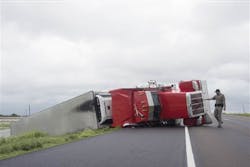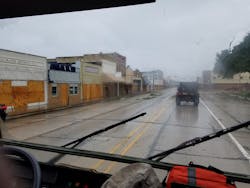Hurricane Harvey may sideline 7% of the trucking industry
Hurricane Harvey will “strongly affect” over 7% of U.S. trucking during the next two weeks, with some portion of that fraction out of operation entirely, according to analysis by freight research firm FTR Transportation Intelligence.
During the first week, almost 10% of all U.S. trucking will be affected, the firm said; a number that jumps near 100% for the Gulf Coast region west of the Mississippi.
After a month, the numbers fall but are still significant, affecting nearly 2% of trucking on a national basis and 25% on a regional level.
Due to the already tight nature of the truck environment, that means that loads could be left on the docks, according to Noël Perry, one of FTR’s partners. And though the largest ripple effects of Hurricane Harvey will be “regionalized” where freight shipments are concerned, transportation managers across the entire U.S. “will be scrambling,” he added.
“Look for spot prices to jump over the next several weeks with very strong effects in Texas and the South Central region,” Perry said in a statement. “Spot pricing was already up strong, in double-digit territory. Market participants could easily add five percentage points to those numbers.”
There are four broad effects from those storm-generated trucking disruptions, he pointed out:
- The most obvious is idle trucks waiting for water to recede from roads and loading docks.
- The second effect is the extra shipments of relief and construction supplies.
- The third effect is extra shipments and lower productivity due to out of cycle supply chain demands.
- Finally, a slowdown in operations due to congestion, circuity and backed up loading docks.
There is also the question of how contract rates between shippers and trucking companies will be affected, emphasized FTR’s Perry.
“There is always a lag between spot rate increases and contract rates,” he pointed out. “Analysts have been wondering when trucking contract rates will begin following spot rates up. The combination of regional and fuel effects from Harvey, coupled with the electronic logging device (ELD) mandate in December, could be the catalyst to a pricing spiral.”
More broadly, FTR said it has studied the freight transportation impacts several major weather events, starting with Hurricane Katrina in New Orleans 12 years ago.
That research indicated major “weather events” such as hurricanes generate “significant pricing effects” in the freight sector, FTR said, highlighted by seven extra percentage points of annualized pricing for the five months following Katrina in 2005 and a peak of 22% year-over-year spot price increases following the “monster winter” of 2014.
On top of those more generalized impacts, the firm stressed that Texas provides 30% of U.S. petroleum refinery capacity – a production base hard hit by Hurricane Harvey.
The Texas Gulf Coast is home to 4.944 million barrels per day (b/d) of refining capacity, while the Louisiana Gulf Coast is home to 3.696 million b/d of capacity, according to the U.S. Energy Information Administration (EIA).
As of Aug. 28, roughly 2.2 million b/d of Texas refining capacity remained down, the agency noted.
As a result of that, FTR said regional diesel supplies will be strongly affected, with national prices jumping as well.
“With companies such as Exxon Mobil and Phillips 66 closing down their refineries, we are talking about impacts to fuel and energy,” noted Larry Gross, another FTR partner, in a statement.
“In addition, Houston is a big interchange point for rail and intermodal, so it’s not just trucking which will be disrupted. Freight cars are sitting idle outside of Houston,” he added. “Will they wait out the storm or be re-routed? Of course, those final miles from the rail yards are still dependent on trucks. Freight transportation is an integrated system, and this becomes more obvious during major weather events when disruptions occur.”
About the Author
Fleet Owner Staff
Our Editorial Team
Kevin Jones, Editorial Director, Commercial Vehicle Group
Cristina Commendatore, Executive Editor
Scott Achelpohl, Managing Editor
Josh Fisher, Senior Editor
Catharine Conway, Digital Editor
Eric Van Egeren, Art Director

